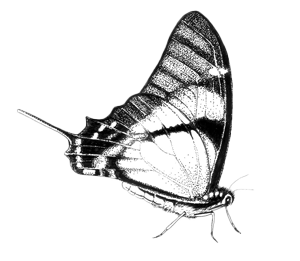

First and foremost, we are a small company and plan to keep it that way. 21 years ago, in 1994, we (Ian Green and Fiona Dunbar) started Greentours, from the back bedroom of our flat in Norfolk, where we had both been at University studying Ecology, with one computer and a new fangled phone/fax machine. We still have customers travelling with us who came with us on in our first year, or indeed on our first tour!
Ian, who had already been leading and organising wildlife tours for other companies, noticed a yearning on the part of many of his customers. Those on birding holidays rather wanted to stop and look at the butterflies and flowers that were being passed by, and customers on butterfly trips were covertly sneaking looks at bird books, floras, and even the odd tome on reptiles… Sometimes, there would even be couples with different areas of wildlife interest! Again guided by the desires of our customers, we have more recently started offering our popular photography, wildlife at leisure and Alpine Garden Society tours.
Greentours was therefore born, with the aim of looking at the best of the flora and fauna of areas chosen from all over the world. Our leaders are chosen for their in-depth knowledge of a range of areas of natural history and the social skills which ensure they will give our customers a most enjoyable holiday. In summary, our holidays are all about great wildlife, great scenery, good company, food and fun, and not too much strenuous exercise!
Both ecology graduates, we try to follow ecological ideals within Greentours, from using recycled paper, through to donating binoculars, telescopes, tripods and field guides to local guides in areas where these items are hard to come by and out of the price range of local people. Having actively supported Carbon-off-setting for over a decade, we are pleased to continue that support through Rainforest Concern, who channel the funds we provide directly into Carbon-offsetting and conservation projects.
Your suggestions are important to us. We are always interested to hear where you would like to go to next, or if you have any suggestions about the website or our tours. So if you have any queries or suggestions, do contact us.
We look forward to experiencing many more wonderful days in the field, with both new faces and all our regulars alike.
We use, wherever possible, locally owned hotels, locally run facilities, and where possible purchase local produce. We provide binoculars, telescopes, field guides and other equipment (much of it donated from our customers so please continue to do so), as well as helping to train local leaders in flora and fauna identification and local ecology. This enables them to earn a living from showing and interpreting their local fauna and flora to visitors.
Greentours is a corporate member of the African Bird Club and the Ornithological Society of the Middle-East. We provide valuable species records to relevant organisations including a vast amount of biogeographical data. As an example Greentours clients and leaders spend more person days in the Aksu-Dzhabagly Reserve in Kazakhstan than do the resident scientists. Every tour report represents an increasing and already vast data source. We provide key data to relevant organisations such as the finding of species new to countries, flagging up previously unknown populations of vulnerable species, and even finding new species to science.


Forest Credits, from Rainforest Concern, is a programme that allows you to offset your carbon emissions and at the same time help protect native forests, their biodiversity and the important environmental services they provide, creating a lasting environmental legacy.
The idea was conceived when donors and supporters approached Rainforest Concern about carbon offsetting. In the context of increasing international focus on REDD (Reducing Emissions from Deforestation and Forest Degradation), they realised that with 20 years’ experience in forest conservation and working with local organisations and communities, they were perfectly placed to offer credible forest-based carbon offsetting adhering to the highest standards.
The carbon assessment of their projects is undertaken by well-respected independent auditors using a combination of satellite and ground-based measurements following the Intergovernmental Panel on Climate Change’s (IPCC) Good Practice Guidelines on greenhouse gas reporting, also adopted by international standards.
Forest Credits is a not-for-profit programme and Rainforest Concern strives to keep their administration costs as low as possible to ensure that maximum funds reach their projects.
Rainforest Concern was established in 1993 to protect threatened natural habitats, the biodiversity they contain and the indigenous people who still depend on them for their survival. At present the organisation has 18 conservation projects in 12 countries: Ecuador, Peru, Chile, Colombia, Brazil, Romania, Suriname, Costa Rica, Panama, India, Sri Lanka and Uganda. They work closely with local conservation organisations in these countries to protect rainforests.
Central to Rainforest Concern’s philosophy is the establishment of strong partnerships with small yet dynamic organisations in the countries where it operates. Such long-term partnerships have repeatedly shown to result in the continued success of projects.

Direct conservation involving the protection and management of forested land to create protected reserves. This sometimes includes the purchase of land, usually in the name of the local NGO or the local communities. Particular emphasis is placed on the creation of forest ‘corridors’ that connect existing protected areas thereby avoiding the risk of fragmentation. This greatly assists the effectiveness of these reserves by enabling species to move freely from one to another. Reforestation of cleared areas of forest with native tree species also falls into this category.
Programmes of alternative income generation, health and education are developed with the local communities living near the projects. These are designed to reduce the negative human impact on forests arising through, for example, cattle ranching and subsistence farming. Examples of these projects include sustainable small-scale horticulture (for example cultivation of shade grown coffee), the production of handicrafts and responsible ecotourism.
Research in biodiversity is encouraged. Scientists and students from national and international universities have undertaken and continue to undertake research at several of the projects. They also have well-established volunteer programmes. These include groups of gap year students as well as mature volunteers who work on projects that include tree planting, trail maintenance and data collection.
Forest Credits projects have been carefully chosen and designed to ensure that a true carbon saving is attained, while also including additional benefits such as biodiversity protection, community participation and sustainable development, all of which have greater value and permanence.